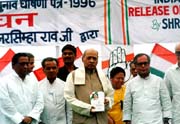A New Beginning
 Fourth, 1996 saw a major electoral backlash against a discredited
political elite (both leaders and parties) and derailed system
of governance. The result was that no single party returned to
power (in the sense of enjoying a majority in Parliament) and
with the voters' preference for local issues, the system was forced
to structure the process of governance around a coalition of small
and regional parties which, incidentally, happens to be a coalition
mostly composed of middle and lower castes in the social hierarchy.
Fourth, 1996 saw a major electoral backlash against a discredited
political elite (both leaders and parties) and derailed system
of governance. The result was that no single party returned to
power (in the sense of enjoying a majority in Parliament) and
with the voters' preference for local issues, the system was forced
to structure the process of governance around a coalition of small
and regional parties which, incidentally, happens to be a coalition
mostly composed of middle and lower castes in the social hierarchy.
Fifth, this necessity forced the acceptance of a far more federal
system of governance (both regionally and socially speaking),
than was ever achieved by the proponents of states' rights earlier
on (including by a cabal of state level chief ministers in the
early and mid-eighties). And sixth, and perhaps more basic than
anything else, there has taken place an unprecedented coming together
of secular forces, at both mass and institutional levels, for
the first time putting on the defensive communal and fundamentalist
forces.
The combination of these six factors, each one of them
building on the idea of democracy which had been promised at the
very dawn of independence, but had been sidelined due to the hijacking
of the whole democratic apparatus by a small minority of politicians
and bureaucrats in league with entrenched interests in rural,
urban, professional and international arenas can lead to the beginnings
of a transition - transformation - to a new system of governance.
 The political process unleashed by this new awakening, will, of
course, be subjected to a lot of backlash from those who have enjoyed
power and privilege for close to half a century. Also, the new
bearers of power from the deprived sections will not necessarily
pursue the interests of the large masses in whose name they are
likely to assume power (as some of them already have). There is
still a long way to go as far as the masses are concerned. They
will continue to have to press upon the merging new coalitions
that come to power following 1996 and other succeeding elections.
The political process unleashed by this new awakening, will, of
course, be subjected to a lot of backlash from those who have enjoyed
power and privilege for close to half a century. Also, the new
bearers of power from the deprived sections will not necessarily
pursue the interests of the large masses in whose name they are
likely to assume power (as some of them already have). There is
still a long way to go as far as the masses are concerned. They
will continue to have to press upon the merging new coalitions
that come to power following 1996 and other succeeding elections.
In reality they will have to get engaged in transforming the very
process of governance and the nature of the State.
In large parts of the world governments are found to pursue policies
that prove inimical to the well being of large sections of the
people. This includes governments that claim to represent - and
some of them do represent - deprived social strata, progressive
ideologies and sets of policies that were designed (at least to
begin with) to benefit the poor and the oppressed.
There are always limits to what governments can do. The modern
State is a complex of promises and betrayals. There is never a
respite in politics, never a point of final arrival. Of all the
things that India has inherited and imbibed, in both theory and
praxis, democracy stands out as having the most cutting edge,
at any rate for the poor and exploited mass of the people. As
the torch of democracy passes down the social terrain, it must
make things better. But it will still be an uphill task.
|

